It was an eventful two weeks in Turkey, and I will certainly miss the ease of travel, intellectually curious and friendly people, and all around pleasantness of travel there.
In sum, our journey took us from Istanbul to Edirne, to Ankara, Cappadocia, back to Istanbul to see Sheela off on her flight to the US, and an overnight trip to the city of Bursa.
We saw amazing sights. The greats mosques of Bursa, Edirne and Istanbul, the capitols, respectively, of the Ottoman Empire. These all had looming domes, exquisite calligraphy, and architecture to easily rival the great cathedrals of medieval Europe.
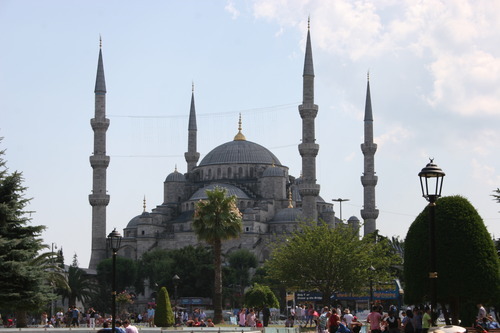
Of all, Edirne contained perhaps the most hidden of gems: an Ottoman Era Medical College. Its advanced medical facilities, built in the 15th century surpassed anything in christian Europe at the time, or elsewhere in the world, for my knowledge. Among its treatments, it experimented in musical therapy and in treating the psychologically unstable, rather than chaining them to a wall—which made it truly revolutionary for its time.
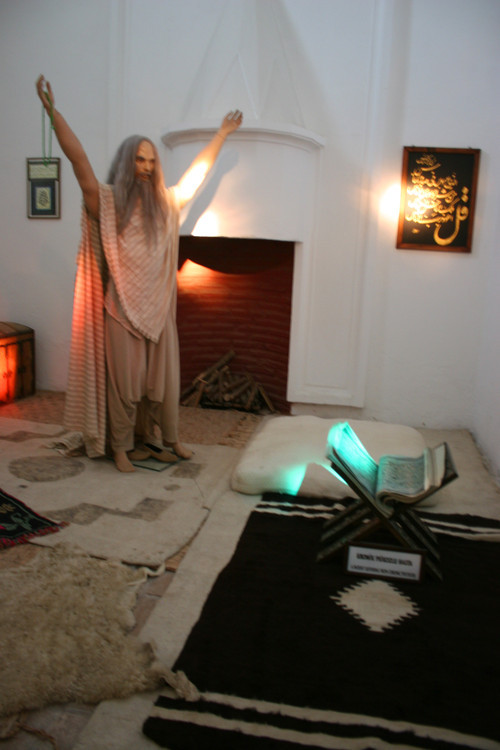
Situated across the river from town, where the wheat fields mix with green grass, the elaborate stone Medical College turned museum is a testament to humanity’s progress. Sadly, it floundered centuries after it’s construction, mirroring the path of the ever more intestate Ottoman Empire. Where it once attempted treatment for the insane, by the 19th century it chained them to walls and fed them only bread and water. Its other disciplines, like surgery, suffered similar degradations over time.
In Edirne, among other sights like a few great mosques, we also saw the historic synagogue, the largest in the Balkans, undergoing restoration.
Bursa is a city that does not easily give up its gems, or at least is hard to find reliable information about them. The city is famous for the mountain, Uludag, that it crawls up and around. We went to the cable car to take what we had heard was a stunning journey up the 2,500 meter mountain. But it had been closed since 2012, despite this fact not being represented in any of the travelguides (Lonelyplanet, tripadvisor and wikitravel).
Instead, all we found was a lonely security guard who had set up a rather comfortable chair watching T.V, and guarding an empty station.
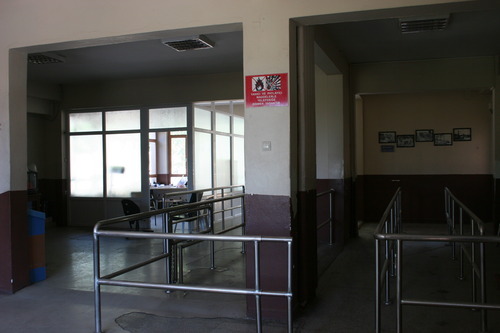
But we did find a very interesting tomb of one of the Sultans.
In my never ending quest, which was at first inspired by Sheela three years ago in India, to visit all of the Synagogues in all of the cities I’ve traveled to . In reality, it is not really synagogues I am visiting—they are the shells of their former selves, their communities gone. Now all they are, are just buildings, reliant on the vagaries (so far, mostly benevolent) of local and federal governments, sometimes with Israel’s aid, as in the case of the Kerala synagogues, to maintain them.
What is the purpose of a building if the people who made it special are no longer existent? Is there any spiritual connection I feel to shared experiences Jews in these withered locations? Maybe I enjoy, in some manner, the sadness I feel when I see Jewish communities the world over, all gone, and likely never, ever to be rebuilt.
I don’t know, but I do know that it is an era of history that will not be seen again. The distinct communities of Jews worldwide are gone, replaced by ethnic and cultural diffusion in the US, and concentration in Israel. This is what in part made Jews so unique. They were stateless, reviled often, forming small communities in cities across the world, and using their connections in other cities for trading. What will be the shared experience of Jews now? Will its future be in nationalism (a la Israel)? I feel the irony here is too much to bear. I see the particular European ethnic nation state as the enemy of Judaism. Ideas of nationalism (such as movements for a unified Germany for Germans for instance, or France, or Italy…) spawned ideas about racial superiority. Without first having knowledge of nationa
lism you cannot have thoughts of fascism.
Of these communities, I have a remarkable story. In Bursa, Mindy and I went hunting for the main synagogue in the city as well as a series of fish restaurants for dinner, all owned by brothers, on the same street (Sakarya Cd).
We went to what google maps told us was Sakarya Cd but found that it was devoid of restaurants at all, let alone synagogues. Locals we asked had never heard of either fish restaurants or synagogues.
That night, downtrodden and recovering from a stomach bug, I came across a website showing another Sakarya Cd. Before leaving the next day Mindy and I did find both the restuarants and synagogue (Gudesh Synagogue). While I was peering into the peep hole of the unmarked building, trying to figure out if it was what I though, and old man beckoned me over to his.
He pointed, saying “Synagogue.”
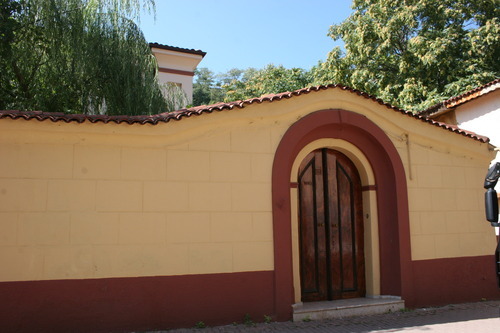
I asked if he spoke English. He said, “Spanish and Turkish”
Instantly I knew that he was a Jew, one of those who the Spanish had forced out in the 14th/15th centuries and who the Ottomans had welcomed. These communities which had been in present day Greece and Turkey, had spoken spanish in the five centuries since their expulsion.
With hand gestures and minimal english and spanish, Mindy, him and I communicated. We learned that there were only 60 members (elsewhere online it says 140 members left) of the community left, that the second synagogue had been closed, that all the young had gone to Istanbul, Israel or Medina (?). I’m uncertain about the last city, because Medina, Saudi Arabia seems and odd place for Jews to go.
When we returned to Istanbul, another old man (not a jew this time) saw me staring off into the distance. He helpfully pointed out that I was looking at the largest synagogue in Istanbul. I was staring in its direction looking at graffiti, but hadn’t even noticed it, so well hidden it was!
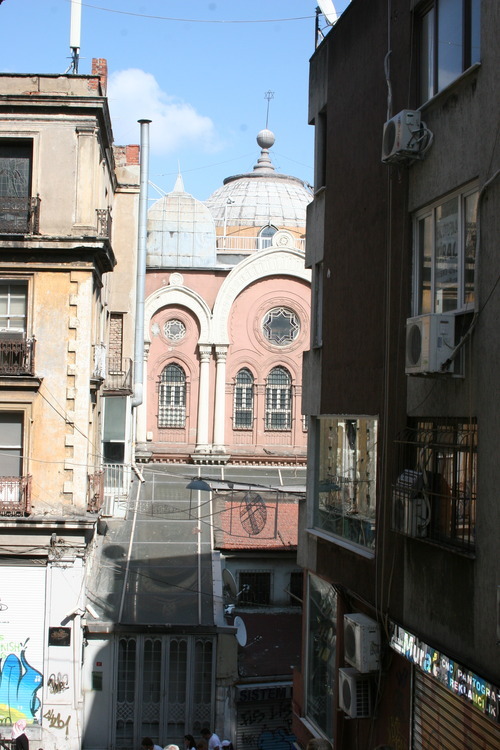
Cappadocia is other worldly. Vast rockly towers of volcanic remnants create something that looks like its out of a starwars set—in fact Starwars had wanted to film here! (but the Turkish gov rejected the proposal so it was forced to build a set in Tunisia). We had an excellent time staying in Goreme. I cannot highly recommend traveling here enough. We met a former Fulbrighter here, as well as our hotel owner, who told Mindy that everything he had was hers, and that as long as she did the typey typey emailing business of the hotel, they could get married and live happily ever after.
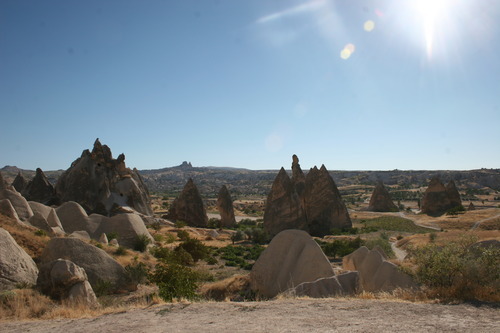
In addition to fairy chimneys in Cappadocia are numerous churches carved in to the roc, some with biblical creatures drawn on them, including a few that look oddly like dinosaurs—so Sheela and I had fun making T-Rex claws.
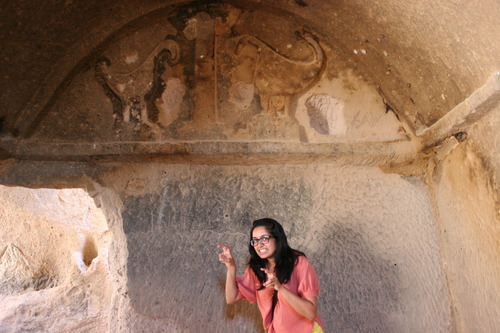
Because Cappadocia was a christian area under the romans (before Constantine) it came under persecution. The people built their creatives hideaways, one of which is a 7 story enormous underground city, complete with a multiple living chambers, a mortuary, a church, jail (sort of), wells and airflow shafts. They stopped digging when cracks begin to form on the 7th level.
Ankara is to D.C. as Istanbul is to NYC. The cities share an uncanny symmetry. Istanbul like New york is the cultural capitol, and where all the magic and banking etc happen. It can be dirty at times, with both crowded alleys, and expensive shops and feels multicultural (of course, given the city’s history). Ankara has planned neighborhoods and wide avenues filled with, you guessed it, Government offices.
And that, in sum, was my experience in Turkey. I had an amazing time with Sheela and Mindy, who make for great traveling partners (including all the bother bother bother). I will miss them both, but hopefully I will see Sheela soon!
———————————-
Now, a short taste of India!
Me at the Oberoi hotel: “Hi, I’m looking for an ATM.
Sir, the ATM is at the car park. It is one km away.
Sure, how would I walk there?
Sir, I would not recommend walking; there are many beggars. Take a car.
From door to door I have not had better service. At every moment from the airport to my room, a member of the Oberoi hotel has been there to guide me. Essentially it has been an entirely thought free process-but that’s what money can buy you! Also relaxing is that staff are not encouraged to take tips, which takes the anxiety out of wondering whether or not I should tip the guy carrying my bags.
How was your flight, sir? asked the receptionist
It was ok.
By that you mean it was not good, she said with a smile.
I’ve been sick, so it wasn’t pleasant.
Sorry to hear that. Would you like us to call the doctor?
Uh…Sure. That would be great (Wow, I’m thinking—of course they would have a doctor on staff).
45 minutes later a very professional doctor shows up at my room, prescribes medication and takes his leave. Two or three minutes later, with alacrity considering the hotel actually doesn’t have a pharmacy, the medicine arrives at my room.
Incredible efficiency!
The Oberoi for all its grandness, posh and extreme splendor, certainly makes it difficult to walk anywhere, choosing to take the stairs, for instance, sets of the alarm siren. Security guards look quizzically at bodies in motion. But, not having to walk is the whole point, right!?